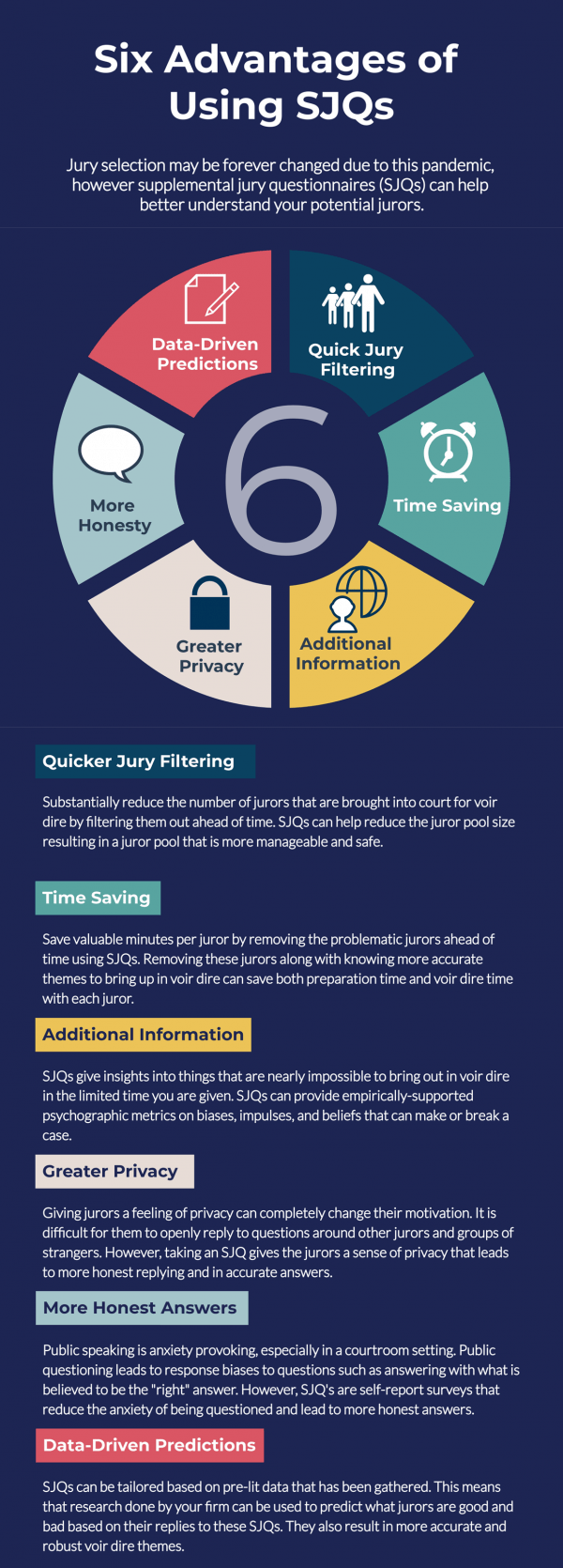COVID-19 and SJQs

COVID-19 is a tragedy that has affected our nation in a way no living American has ever seen. It has changed our face-to-face interactions, our feelings of safety, our trust in our government’s safety protocols, and nearly every other aspect of our day-to-day lives. However, through even the toughest of times, the foundations and rights that our country was founded upon will continue to persist. This tragic health crisis is devastating to us all, but that does not mean our justice system should come to halt. Instead, it should simply adjust. The court is a fundamental institution in the United States, but that does not mean it cannot be adapted for these trying times. Changes must be put in place to allow our justice system to continue regardless of the current health climate.
One positive outcome from these trying times is that COVID-19 can become a catalyst for change in our justice system. It is causing an archaic, outmoded system to make updates that have often been spoken about but never put into place. This virus can lead to changes in the use of technology, alternative methods, and data-driven approaches. These changes are most salient in the context of jury selection. Jury selection is believed to be the most crucial stage in court proceedings for both the plaintiff and defense teams. A change in jury selection methods that is already being implemented in hundreds of jurisdictions is the increased usage of supplemental juror questionnaires. These questionnaires are arguably one of the strongest jury selection tools available to attorneys.
Supplemental Jury Questionnaires
Supplemental Juror Questionnaires, or SJQs for short, are an extremely powerful tool in jury selection. But, this power can only be honed when these questionnaires are done correctly. Historically, SJQs have been used to simply check a few demographic stereotypes and make sure that the jurors do not know anyone on the defense’s side. However, they can be much more than that. Over the past half-decade, SJQs have become longer, more detailed, and more intrusive for jurors. This led to many courts and jurisdictions viewing SJQs as more burdensome than beneficial. Yet, COVID-19 has changed that. When done effectively, SJQs can be a robust tactic that can make jury selection in this modern-day crisis less of a burden on attorneys, jurors, and the justice system as a whole. Supplemental juror questionnaires have a large number of benefits and very few drawbacks.
Six Reasons Why You Should Use Supplemental Jury Questionnaires NOW!

1. Quickly Filter Out Jurors
SJQs can be used to substantially decrease the number of jurors needed in-person. With the current health crisis, this is of great importance to not only the jurors and attorneys but the justice system as a whole. Fewer people in the courtroom means a significantly decreased likelihood of contracting COVID-19. These questionnaires can be sent through the mail or done virtually. Once received back, they can be used to strike specific jurors for cause based on their replies to the listed questions. Moreover, the pre-filtering of jurors can ultimately lead to opening the courts sooner and a quicker return to some sense of normality in the courtroom.
2. Time Savings
Though not always easy to develop, SJQs can save attorneys hours in their pretrial preparations and valuable minutes in voir dire questioning for each juror. These SJQs can uncover many biases that an attorney would try to bring out in voir dire. With these biases out of the way, they can ask more detailed questioning on compensation numbers and case-specific details. SJQs also lead to faster information and jury filtering. It is much easier to run voir dire with 20 potential jurors that have been pre-screened rather than a full list of 60+ potential jurors.
3. Additional Information for Voir Dire
SJQs can give attorneys insights into the jurors before they even start voir dire. This allows attorneys to focus their questioning on specific themes that were found to be the most detrimental to the case. These SJQs can give insight into juror biases, personality traits, beliefs, demographics, values, and much more. Without these questionnaires, gathering this information would only be done through background checks and voir dire questioning.
4. Greater Feelings Privacy for Jurors
From a juror’s perspective, privacy is extremely important. They are thrown in front of a group of strangers who want to bombard them with technical questions about a case they likely do not even want to hear about. A questionnaire, however, can be much more comfortable for the jurors and easier to answer than oral questioning in front of a group. In the end, regardless of the type of questioning, their answers will be known by the attorneys, but the feeling of privacy and ability to at least protect their answers from being spoken publicly in front of other jurors is of great importance to them. This feeling of privacy can make a positive impact on whether they will put maximum effort as a juror.
5. More Honest Responses
Due to feelings of privacy, SJQs allow jurors to answer a question without social pressure. Social pressures can lead to deception and bias. Public oral questioning, such as voir dire, can lead to a number of response biases such as social desirability bias, or the need to look socially desirable with one’s answers. Self-report measures, such as SJQs, suppress these biases and deceit resulting in more honest answers that are of higher quality and accuracy than oral questioning.
6. Data-driven Predictions
Possibly the most important advantage of SJQs is the ability to make data-driven predictions from their results. Unlike oral questioning, SJQs done in advance can be paired with pretrial research. This means that the pretrial research can be used as training data for algorithms that can then predict whether a juror’s specific demographic and psychographic profile is good or bad for your case. To put it simply, SJQs can help not only filter out jurors for cause based on their biases but also help develop the voir dire themes to focus on, help decide which questions to direct to which juror, and even pick the juror that would be the best foreman based on personality traits. These predictions are extremely powerful and can be a game-changer in your jury selection.
Drawbacks of SJQs
Though SJQs have a large number of advantages, they also have a few limitations.
1. Court Limitations
They are limited to what the court allows. Some courts do not allow SJQs at all. Other courts may allow them but to be given the day before or day of jury selection making some of their benefits more difficult, but not impossible.
2. Dependent on Quality
SJQ benefits are highly dependent on their quality. Poorly created SJQs can be worth little more than simple background checks. High-quality SJQs result in high-quality results. It takes time and a team of subject matter experts and behavioral specialists to create effective and accurate SJQs that can lead to the best outcomes in your jury selection.
3. Advanced Analytics
SJQs require high levels of knowledge in advanced analytics and psychometric techniques. These questionnaires cannot simply be put together or analyzed by anyone. They must be created, validated, and analyzed by teams of data specialists. The creation of the questionnaires involves psychometric techniques from the fields of law, psychology, and sociology. The analysis of the completed SJQs must be conducted by individuals familiar with advanced quantitative and qualitative analytics as well as machine learning and AI technology. It is not an easy endeavor.
How Jury Analyst Can Help
You can see that the benefits far outweigh the drawbacks, especially when many of the drawbacks can be remedied by hiring trial analytics companies like us. We, at Jury Analyst, are able to do the heavy lifting for you.
We are building an incredible data platform that manages all of the processes required to prep for jury selection, including SJQs. The development of an SJQ takes time and that means you will need to engage with us for help—ideally, the earlier the better. The optimum lead time for contacting us would normally be approximately six months prior to your case’s court date. In the event you do not have this amount of lead time, our Virtual Focus Group platform will allow us to get you the information you need through testing various themes and topics, gaining public sentiment on the issues pertinent to your case, and more.
Jury Analyst will supply you with the key elements needed to develop your SJQ. Utilizing our network of virtual jurors, we perform essential pretrial research in multiple stages. Jury Analyst can also conduct segmentation Virtual Focus Groups to uncover experiences, stereotypes, and biases that jurors are reluctant to divulge during oral voir dire questioning. You will obtain a virtual juror pool with an accurate, true-to-life potential jury panel based on your local jurisdiction.
With data analysis, our algorithms, and extensive data sources gathered from these Virtual Focus Groups, we next help you to design juror profiles to uncover the best and worst jurors for your case. With our customized SJQs and targeted oral voir dire services, we also help define critical questions to match to your juror profiles. This ensures you connect the profiles from your Virtual Focus Groups to potential jurors sitting in the box.
How to Get Your SJQ Approved
Simply ask! This current health crisis has opened doors in the justice system that have historically been closed. Most attorneys who have been working in the same jurisdiction for years have accepted the fact that their jurisdiction does not allow SJQs. But, have they asked? Especially now, a simple request for an SJQ can go a long way. Describe to the court how beneficial they can be to the court as a whole. If juror safety is the court’s number one concern, then SJQs should be standard. They help lower the risk for contracting coronavirus by decreasing the number of jurors needed in-person and ultimately making courtrooms more manageable. Lastly, this should lead to a quicker return to the courtroom and an easier transition to what may possibly be the new norm.
